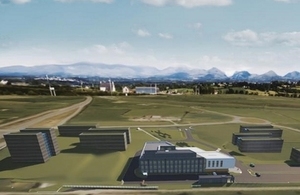UKAEA to design national thermal hydraulic facility
£40 million advanced nuclear reactor technology centre is planned for Menai Science Park in Anglesey

Artist impression of the national thermal hydraulic facility
Press Release, Wednesday 28 November 2018
The UK Atomic Energy Authority (UKAEA) has been appointed by the UK and Welsh Governments to develop the outline design of a proposed £40 million national thermal hydraulic research and testing facility, to be built in north Wales.
The facility was announced in the Department for Business, Energy & Industrial Strategy’s ‘Nuclear Sector Deal’ and aims to boost the UK’s nuclear new build programme and development of Small Modular Reactors and Advanced Modular Reactors.
The proposed centre will focus on thermal hydraulics – the movement of heat and fluids in the reactor system during the conversion of nuclear energy into electricity. Detailed understanding of these processes is vital in designing safe and efficient future power stations, such as those planned for Wylfa Newydd in Anglesey and Hinkley Point C in Somerset, and in ensuring their safe operation throughout the several decades they are expected to generate electricity.
The facility could also have wider uses in non-nuclear thermal hydraulic testing.
Outline planning permission has been secured at Menai Science Park, Anglesey. The facility itself is expected to create around 30 permanent jobs, with further benefits to the local economy. The testing hardware will be accompanied by a research centre for up to 50 visiting scientists to carry out data analysis, computer modelling and simulation work. Intended to be the most modern of its kind in the world, it is seen as integral to the development of advanced nuclear technologies.
UKAEA’s role will be to work with UK companies to identify how their requirements can be met by the thermal hydraulics facility. This information will then be used to produce a design with a detailed costing and operational model, which will enable the UK and Welsh Governments to develop business cases for the funding and decide during 2019 how best to proceed with construction, commissioning and eventual operation.
Colin Walters, Project Director at UKAEA, said:
UKAEA is already working with Government and industry partners on upgrading the UK’s nuclear skills and facilities to compete with the best in the world. This key facility in north Wales will be another part of the UK’s nuclear renaissance and we are glad to have been chosen to lead it. We are now consulting with potential users of the centre so we can incorporate their requirements in the outline design.
Companies interested in participating in the design consultation should contact Amanda Brummitt, Project Manager at UKAEA: amanda.brummitt@ukaea.uk
Ends
For more information please contact Nick Holloway, UKAEA Media Manager – nick.holloway@ukaea.uk / 01235 466232.
Notes to Editors
UK Atomic Energy Authority
The UK Atomic Energy Authority (UKAEA) researches fusion energy and related technologies, with the aim of positioning the UK as a leader in sustainable nuclear energy. It oversees Britain’s fusion programme, headed by the MAST Upgrade (Mega Amp Spherical Tokamak) experiment. It also hosts the world’s largest fusion research facility, JET (Joint European Torus), which it operates for European scientists under a contract with the European Commission. Based at Culham Science Centre near Oxford, UKAEA is an executive non-departmental public body, sponsored by the Department for Business, Energy & Industrial Strategy.
More information: www.gov.uk/ukaea. Twitter: @fusionenergy
Nuclear Sector Deal
The Nuclear Sector Deal, published by the Department for Business, Energy & Industrial Strategy in June 2018, builds on the Government’s historical partnership with the UK nuclear sector.
It will ensure that the UK’s nuclear sector remains cost competitive with other forms of low-carbon technologies to support the Government’s Clean Growth Strategy and Grand Challenge. Through adopting new construction techniques and innovative approaches to manufacturing, the deal will reduce the costs of building new reactors in a way that builds domestic supply chain capability and skills.
More information about the Nuclear Sector Deal